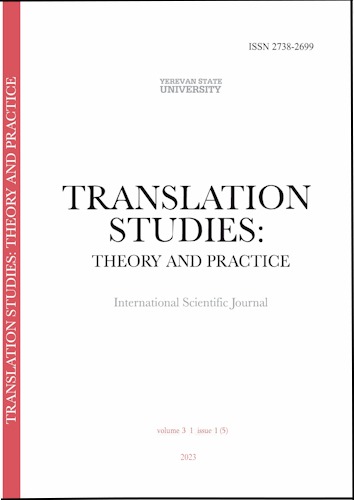University-based Training Courses for Literary Translators in the Twenty-First Century: An Overview from the United Kingdom
DOI:
https://doi.org/10.46991/TSTP/2023.3.1.005Keywords:
translator training, postgraduate degrees, translating literature, higher education, MA Literary TranslationAbstract
As part of a wider project exploring literary translation in the United Kingdom, the present article profiles the three named postgraduate taught courses focusing exclusively on literary translation which are currently available at universities in the United Kingdom: the MA in Literary Translation at the University of East Anglia (UEA); the MA in Literary Translation Studies at the University of Warwick; and the MA in Audiovisual and Literary Translation at the University of Essex. After providing a concise summary of the situation regarding (literary) translator training in the British context, online sources are used to obtain information regarding the structure and course content of each of the three degree programmes under analysis. The findings are presented, contrasted, and discussed, before some proposals for further research are outlined.
References
American Literary Translators Association. n.d. Getting Started in Literary Translation: The Making of a Literary Translator. Accessed April 5, 2023. https://literarytranslators.org/sites/default/files/imce/Publications/Guides/MakingOfALiteraryTranslator.pdf
Boase-Beier, Jean. 1998. “Can You Train Literary Translators?” In Rimbaud's Rainbow: Literary Translation in Higher Education, edited by Peter Bush and Kirsten Malmkjær (p. 33-42). Amsterdam/Philadelphia: John Benjamins Publishing Company. DOI: 10.1075/btl.21.05boa
CIOL Qualifications. 2023. CIOL Qualifications Level 7 Diploma in Translation (DipTrans). Accessed April 5, 2023. https://www.ciol.org.uk/diptrans
European Commission. 2014. 60 Universities Receive ‘European Master's in Translation’ Label. Accessed April 5, 2023. https://ec.europa.eu/commission/presscorner/detail/en/IP_14_625
European Commission. 2023. List of EMT Members 2019-2024. Accessed April 5, 2023. https://commission.europa.eu/resources-partners/european-masters-translation-emt/list-emt-members-2019-2024_en
Fang, Xia. 2021. “Translation As Creative Writing Practice.” New Writing, 18(2): 162-176. DOI: 10.1080/14790726.2020.1762665
Hodáková, Soňa, and Emília Perez. 2022. “Teaching and Learning Translation and Interpreting in the Time of COVID-19: Preparation, Class Content and Activities and Assessment (The Slovak Case).” In Translation and Interpreting in the Age of COVID-19, edited by Kanglong Liu and Andrew K. F. Cheung (pp. 269-290). Singapore: Springer Nature. DOI: 10.1007/978-981-19-6680-4_14
Hoyte-West, Antony. 2020. “Interpreter Training in the Republic of Ireland: An Overview.” Verbum, 11:8. DOI: 10.15388/Verb.19
Hoyte-West, Antony. 2022a. “Literary Translators as an Elite: A Preliminary Overview.” Sociologia și asistența socială: cercetare și profesionalizare, 2022: 184-190.
Hoyte-West, Antony. 2022b. “The EBRD Literature Prize: Exploring Geographical and Linguistic Diversity in a New Translation Award.” Ezikov Svyat (Orbis Linguarum), 20(3): 412–421. DOI: 10.37708/ezs.swu.bg.v20i3.12
Hoyte-West, Antony. 2022c. “Exploring Translator and Interpreter Training in the Trinidad and Tobago Context: An Overview.” English Studies at NBU, 8(1): 43-52. DOI: 10.33919/esnbu.22.1.3
Hurtado Albir, Amparo (ed.). 2017. Researching Translation Competence by PACTE Group. Amsterdam/Philadelphia: John Benjamins Publishing Company. DOI: 10.1075/btl.127
Hyde Parker, Rebecca. 2009. “Professionalizing Literary Translation Education.” Translation Journal, 13(2). Accessed April 5, 2023. http://www.translationjournal.net/journal/48literary.htm
King, Katherine M. 2019. Translation 3.0: A Blueprint for Translation Studies in the Digital Age (Doctoral dissertation, University of Washington). Accessed April 5, 2023. http://hdl.handle.net/1773/43983
Malmkjær, Kirsten. 2019. Translation and Creativity. London/New York: Routledge. DOI: 10.4324/9781315648958
Omar, Abdulfattah, and Yasser Gomaa. 2020. “The Machine Translation of Literature: Implications for Translation Pedagogy.” International Journal of Emerging Technologies in Learning, 15(11): 228-235. DOI: 10.3991/ijet.v15i11.13275
Page, Emma. 2018. “So You Want To Be A Literary Translator.” Asymptote (June 20). Accessed April 5, 2023. https://www.asymptotejournal.com/blog/2018/06/20/so-you-want-to-be-a-literary-translator/
Percec, Dana, and Loredana Pungă. 2017. ”Developing Literary Translators’ Competence. A Multi-Leveled Approach.” Romanian Journal of English Studies, 14(1): 122-131. DOI: 10.1515/rjes-2017-0015
PETRA-E Framework. 2023. PETRA-E Framework of Reference for the Education and Training of Literary Translators. Accessed April 5, 2023. https://petra-educationframework.eu/
PETRA-E Network. 2023a. Framework Literary Translation. Accessed April 5, 2023. https://petra-education.eu/framework-literary-translation/
PETRA-E Network. 2023b. Course Database. Accessed April 5, 2023. https://petra-education.eu/course/
Pungă, Loredana, and Dana Percec. 2017. “An Inquiry into Challenges of Literary Translation for Future Professionals.” Professional Communication and Translation Studies, 10(1): 145-154.
Pym, Anthony. 2009. “Translator Training.” Pre-print text written for the Oxford Companion to Translation Studies. Accessed April 5, 2023. http://usuaris.tinet.cat/apym/on-line/training/2009_translator_training.pdf
Pym, Anthony, François Grin, Claudio Sfreddo, and Andy L.J. Chan. 2013. The Status of the Translation Profession in the European Union. London: Anthem Press.
Ruokonen, Minna, and Jukka Mäkisalo. 2018. “Middling-Status Profession, High-Status work: Finnish Translators' Status Perceptions in the Light of their Backgrounds, Working Conditions and Job Satisfaction.” Translation & Interpreting, 10(1): 1-17. DOI: 10.12807/ti.110201.2018.a01
Schmitt, Peter A. 2012. “Bologna, EMT and CIUTI – Approaches to High Quality in Translation and Interpretation Training.” Meta, 57(1): 23-34. DOI: 10.7202/1012738ar
The Nobel Prize. 2017. Kazuo Ishiguro – Biographical. Accessed April 5, 2023. https://www.nobelprize.org/prizes/literature/2017/ishiguro/biographical/
Torres-Simón, Ester, and Anthony Pym. 2019. “European Masters in Translation: A Comparative Study.” In The Evolving Curriculum in Interpreter and Translator Education: Stakeholder Perspectives and Voices, edited by David B. Sawyer, Frank Austermühl and Vanessa Enríquez Raído (pp. 75–97). Amsterdam/Philadelphia: John Benjamins Publishing Company. DOI: 10.1075/ata.xix.04tor
University of East Anglia. 2023a. MA Literary Translation. Accessed April 5, 2023. https://www.uea.ac.uk/course/postgraduate/ma-literary-translation
University of East Anglia. 2023b. British Centre for Literary Translation. Accessed April 5, 2023. https://www.uea.ac.uk/groups-and-centres/british-centre-for-literary-translation
University of Essex. 2023. MA Audiovisual and Literary Translation. Accessed April 5, 2023. https://www.essex.ac.uk/courses/pg00835/1/ma-audiovisual-and-literary-translation
University of Warwick. 2020. MA in Literary Translation Studies. Accessed April 5, 2023. https://warwick.ac.uk/fac/arts/scapvc/wwp/study/postgraduate/malts/
University of Warwick. 2023. Literary Translation Studies (MA). 2023 Entry. Accessed April 5, 2023. https://warwick.ac.uk/study/postgraduate/courses/literarystudies/
Downloads
Published
How to Cite
Issue
Section
License
Copyright (c) 2023 Antony Hoyte-West

This work is licensed under a Creative Commons Attribution-NonCommercial 4.0 International License.










